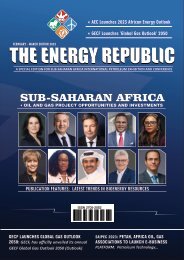The Energy Republic June Edition 2022
In this edition, The Energy Republic provides a comparative analysis of the latest trends and challenges, including the outlook of the African Gas Market with expert commentaries and recommendations on possible ways Africa can develop and utilize its abundant natural gas resources for domestic use and export market earnings.
In this edition, The Energy Republic provides a comparative analysis of the latest trends and challenges, including the outlook of the African Gas Market with expert commentaries and recommendations on possible ways Africa can develop and utilize its abundant natural gas resources for domestic use and export market earnings.
You also want an ePaper? Increase the reach of your titles
YUMPU automatically turns print PDFs into web optimized ePapers that Google loves.
SPONSORED CONTENT
The same people that have been
strongly advocating an end to the use of
fossil fuels, were rushing to OPEC and
its Member Countries to ask them to
ramp up production of the same fossil
fuels because their countries need
energy. This is no different from what
they did some 150 years ago when their
scientist discovered the dangers of
fossil fuel emissions to the atmosphere.
Instead of stopping the use of fossil
fuels, they hid the findings and
continued to use fossil fuels until their
economies got to a stage where it does
not need fossil fuels to sustain their
growth. Then they remembered the
dangers of fossil emissions and are now
telling the world not to use what they
used for over 150 years to develop their
societies and economies.
It is pleasing to note that on February
18, 2022, in Niamey, the Republic of
Niger, APPO witnessed the signing of
the agreement for the relaunch of the
construction of the trans-Saharan gas
pipeline with a length of 4128 km, with
an annual capacity of 30 billion m3
traversing three APPO Member
Countries – Nigeria through Niger to
Algeria and Europe. The Ministers of
energy of these three APPO Member
Countries signed the deal on behalf of
their countries. Although targeted at
Europe, the TSGP has the potential of
supplying gas to the communities
through which it passes, thus creating
the possibility of developing cottage
industries and even large-scale
industries. And with time, the pipeline
can also supply gas to other countries in
the sub-region like Burkina Faso, Mali,
etc.
Both fossil and renewable energy
resources are exceptionally abundant
in Africa. This is the truth. And God has
blessed us with these riches.
Unfortunately, African countries have
remained very dependent on their
crude oil exports, with refining
infrastructure having a very limited
capacity and operating at high costs.
This explains the export of African
crude oil to European refineries and the
return of refined products to African
countries at exorbitant costs.
To put an end to this paradox and
quickly take advantage of this favorable
environment, we are called upon to
create and secure physical oil markets,
Dr. Omar Farouk
Ibrahim
especially the flows between production
areas and supply and consumption areas.
TER: How can African producers work
together to attract the investment needed
to build infrastructure that will allow them
to expand exploration, production, and
exports to meet the anticipated increase in
energy demand within the continent and
across the world?
Farouk: APPO set up a Cooperation and
Mutual Assistance Framework Agreement
which defines the main areas of
cooperation between APPO Member
Countries' Ministries of Hydrocarbons, the
National Oil Companies, economic
operators, and research and training
institutes or centers. The main specific
objectives targeted by APPO are:
- The pooling of their technical and scientific
capacities from upstream to downstream,
- The joining of forces by National Oil
Companies, oil companies, and services
companies to bid for tenders and contracts
relating to hydrocarbon projects and related
industries and activities in the APPO
Members Countries and/or in any other
country,
- The implementation of programs for the
exchange of information and experience,
- The development and implementation of
mutual technical assistance programs by
the secondment of highly qualified
personnel in the hydrocarbon field and
related activities,
- The provision of targeted technical
assistance in the environmental aspects of
hydrocarbon development such as gas
flaring reduction and oil spill management.
TER: What are the main focus areas of
APPO's CAPE VIII in Angola?
Farouk: The main theme of this CAPE 8 is
"The Future of The Oil And Gas Industry In
Africa: Opportunities, Challenges And
Development" and this one is very well
chosen and deals with issues in line with the
concerns of African countries and the major
challenges facing APPO Member Countries,
as well as the promotion of mining fields or
business opportunities through exhibition
stands and or specific presentations or
communications. They will allow exchanges
between experts and policy and decisionmakers.
The theme of CAPE VIII is very topical, and
you would have noted its aptness. The
Congress will be the place to elucidate
certain misunderstood subjects and the illconceived
interpretations that certain
actors and decision-makers have of the
concept of Energy Transition. In reality, the
Energy Transition should not be seen as a
threat to Africa with its abundant proven oil
and gas resources as many think. Far from it,
it is an opportunity to be seized by Africa to
diversify its economies, industrialize and
develop as soon as possible. However, the
Energy Transition poses enormous
challenges to Africa. Africa must take
ownership of its oil and gas industry by itself
at a time when foreign partners are losing
interest in fossil fuels. To do so, African
c a p a c i t y b u i l d i n g , t e c h n o l o g y
appropriation, African oil market
development, and financing of the sector
are the major challenges that Africa must
address.
The African countries must go in synergy to
fa c e t h e s e c h a l l e n ges, t h e n t h e
development of Continental Content and
not Local Content is required for Africa.
Although Africa currently accounts for less
than 10% of global oil and gas production,
there is a consensus that Africa will be most
affected, economically, and socially, if the
world moves rapidly away from fossil fuels.
Indeed, although the continent has over
125 billion barrels and 600 trillion cubic feet
of proven oil and gas reserves respectively,
the African industry has been largely
dominated by foreign technology,
financiers, and operators.
710
THE ENERGY REPUBLIC I SPECIAL EDITION















